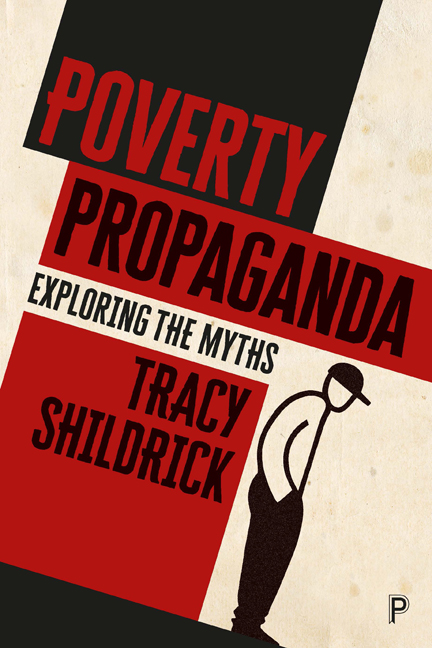Book contents
- Frontmatter
- Contents
- List of abbreviations
- Acknowledgements
- One Introduction
- Two Poverty propaganda
- Three Poverty and lived experiences
- Four Poverty, labour markets and ‘poor work’
- Five Poverty, social class and social immobility
- six Poverty: discrimination, stigma and shame
- Seven Poverty propaganda and reproduction of poverty, power and inequality
- Eight Conclusions
- References
- Index
Three - Poverty and lived experiences
Published online by Cambridge University Press: 09 April 2022
- Frontmatter
- Contents
- List of abbreviations
- Acknowledgements
- One Introduction
- Two Poverty propaganda
- Three Poverty and lived experiences
- Four Poverty, labour markets and ‘poor work’
- Five Poverty, social class and social immobility
- six Poverty: discrimination, stigma and shame
- Seven Poverty propaganda and reproduction of poverty, power and inequality
- Eight Conclusions
- References
- Index
Summary
Introduction
Poverty is an outcome of severe economic stress and a lack of material goods …//… the impact of poverty can bite deep into the home and family life, challenging parents’ capacity to adequately provide for their children and creating the potential for stress, ill-health and in some cases discord. (Ridge, 2009, pp 25 and 30)
“Get them [the government] to live on this street for four weeks …//… they couldn't do it. They don't know what it's like to go to Netto coz they’ve never been. They haven't got a clue about the average person. They wouldn't know what it's like to pick something up and say I can't have that because I can't afford it or to say to your kids, ‘you can't have that’.” (Vera, 54-year-old Teesside interviewee in Shildrick et al, 2012b)
“There are many complex reasons why people go to food banks.” (Prime Minister Theresa May on The Andrew Marr Show, 30 April 2017)
The effects of poverty are material, physical and also increasingly recognised to be psychosocial (Walker and Chase, 2013; Walker, 2014; Mills, 2017). Yet poverty propaganda works to present those experiencing poverty – particularly those claiming out-of-work benefits – as living comfortably. The comparison between the ease and comfort of life on out-of-work benefits and the hardships of a life in paid work is frequently used to evoke prejudice towards ‘welfare’ claimants and engender feelings about unfairness in the system of social support. In the following chapter we will look at some of the difficulties of undertaking low-paid, insecure work and how this adds to the troubles of poverty, but in this chapter we look more closely at the experience of living with poverty and prioritise the accounts of people who have experienced the condition.
Close-up, qualitative, everyday accounts of poverty tend to be much more mundane than the popular and political narratives described in the previous chapter. Accounts of life from those who have experienced poverty also tend to be remarkably consistent. Research shows that those in poverty experience multiple hardships and disadvantages (Hooper et al, 2007; Ridge, 2009; Shildrick et al, 2012; Gordon et al, 2013; Shildrick and MacDonald, 2013; Cooper et al, 2014; Chase and Walker, 2015a, 2015b) and that resilience, fortitude and planning and negotiation are needed to manage day-today living on a low income.
- Type
- Chapter
- Information
- Poverty PropagandaExploring the Myths, pp. 43 - 64Publisher: Bristol University PressPrint publication year: 2018



